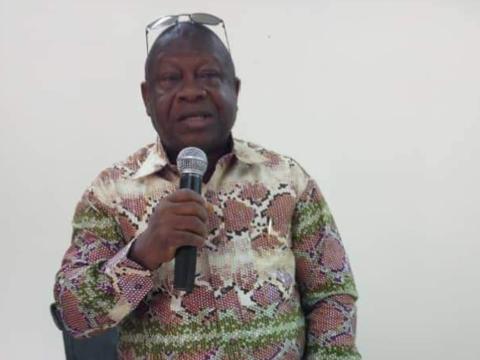By Chernor Alimamy Kamara
In his handing-over notes to his successor, the outgoing Executive Director of the Sierra Leone Standards Bureau (SLSB), Professor Thomas B.R Yormah has outlined the successes achieved during his tenure amidst the challenges of the institution upon assuming office in September 2018.
Prof. Yormah said he ensured access to the testing laboratories were open to all Small and Medium-sized Enterprises (SMEs) clients to bring in their samples directly to the analysts. He said the implications for the quality of the results arising from potential influence by “unscrupulous clients”, propelled him to push for the establishment of the Sample Reception Unit (SRU) with a concurrent ban on free-for-all access to the analysts that work in the laboratories.
“The aim was to bolster the integrity of the testing regime and to give confidence to our stakeholders as to the quality and wholesomeness of the testing process. This, in fact, is a requirement of ISO Good Laboratory Practice,” he said.
He said he met the Food Laboratories running at extremely low throttle, noting that very expensive analytical equipment like the Atomic Absorption Spectrometry (AAS) and High-Performance Liquid Chromatography (HPLC), bought with Destination Inspection (DI) fees still sitting without being installed, calibrated, or working. He stated that the situation changed when he took over making the modern analytical equipment fully operational.
He also said that the Food Microbiology Laboratory is now the most equipped of the three testing laboratories at SLSB with the Petroleum Laboratory perhaps the busiest of the three testing laboratories and ‘’capable of working at odd hours depending on the exigencies of the oil market.”
Dr. Yormah reflected on the Mass Metrology Laboratory was almost non-functional and the calibration certificates of all the standard weights having expired when he took up the job. “Today when the much-delayed issues with the newly purchased mass comparators are resolved by UNIDO, the SLSB mass Metrology Laboratory, which is also part of the ISO 17025 Accreditation journey, is without doubt the best mass metrology laboratory in Sierra Leone.”
He stated that the word ‘certification’ was hardly known at SLSB but said with hard and resilient work by staff, dexterity of management under his watch, guidance and training by UNIDO’s experts and with the financial support of European Union, today SLSB “is the only homebred Internationally Accredited ISO 9001 Management System Body (MSCB) in Sierra Leone and in the Mano River Union.”
He said the Metrication drive, which seeks to sanitize the trading terrain with respect to regularizing measurement of trading products and thereby re-enforcing fairness and value-for-money in trade, had all but floundered. This drive, which he said had been on the SLSB table since 2011, which then succeeded for the petroleum sector, has now been launched in the General Trade under his watch.
Prof. Yormah said attempts are afoot to expand the presently- challenged Destination Inspection (DI) department to a fully internationally- accredited inspection drive as soon as resources are available.
He recalled inheriting a rather dreary work condition, low salaries compared to what obtained in the sister agencies, with risk and other allowances terminated. He added that with the “requisite dexterity, patience, and the help of God Almighty, I was able to turn this ugly tide round within months. Salaries were revised, resulting in some staff almost doubling their then meagre take-homes.”
He however expressed disappointment at not realising one of his greatest dreams of making SLSB a world class National Standards Body (NSB) and positioning it in the vanguard of leveraging standards and quality measures to catalyze the achievement of trade-related social and economic developments.
He expressed for being unable to increase SLSB visibility nationwide that could have seen the establishment of Regional Offices across the country. He said the process started with acquisition of Regional Offices in Makeni and Bo – both at the NASSIT Plazas – but lacked the requisite resources to operationalize those offices.
He also admitted not being able to sanitize “the untidy and unfair trade in Liquid Petroleum Gas (LPG) thereby failing to lead SLSB's contribution to achieving Sustainable Development Goal (SDG3). The genesis of these failures is the lack of financial resources to mobilize the tools of trade.”
Copyright © 2024 Politico (12/08/24)








